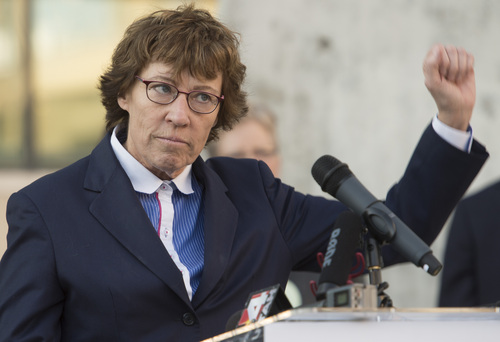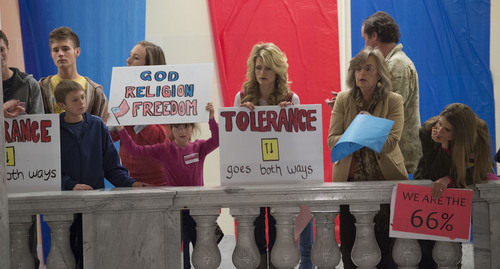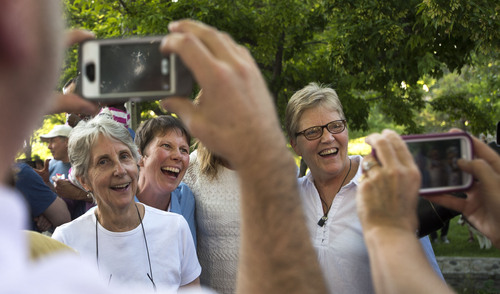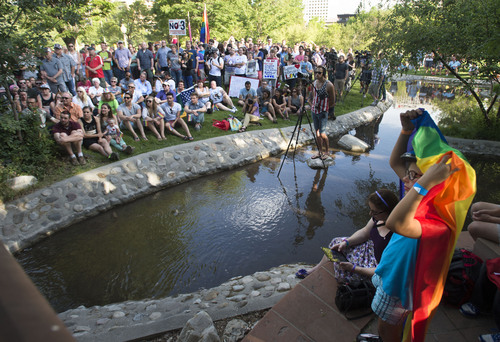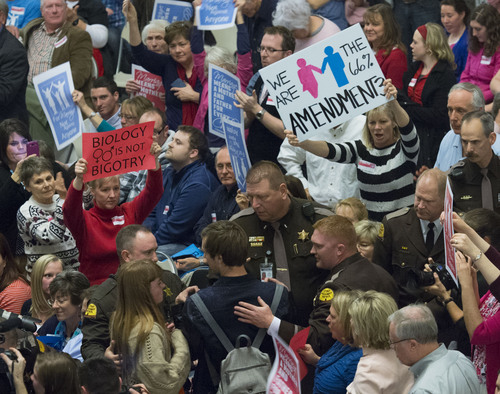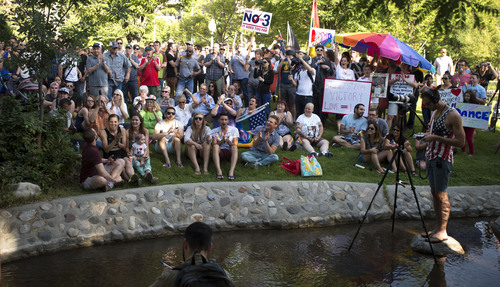This is an archived article that was published on sltrib.com in 2014, and information in the article may be outdated. It is provided only for personal research purposes and may not be reprinted.
It's no coincidence that victors rarely ask for a rematch. When you've won, traditional wisdom says, walk away.
But for the Utah couples attempting to topple a state ban on same-sex marriage once and for good, there will be no turning back until their case — or one like it — lands at the U.S. Supreme Court.
Lawyers for the three plaintiff couples announced Thursday that they will join with Gov. Gary Herbert and Attorney General Sean Reyes in calling for the Supreme Court to hear their case.
It's an unusual move. A denial by the high court could mean victory for gay and lesbian couples in Utah.
But Peggy Tomsic, who represents the three plaintiff couples in Utah's historic Kitchen v. Herbert lawsuit, said she believes the move is a necessary one.
"Just as the state has articulated: This is one of the most important issues of our time and it needs to be resolved," said Tomsic, who works at the Salt Lake City firm Magleby & Greenwood. "Unlike the state, we believe the more important reason that the Supreme Court needs to take this case now is it needs to put to bed finally this question of equality and fairness."
Earlier this week, Utah filed an official petition with the high court, asking the nation's nine justices to take up Utah's same-sex-marriage case.
It's the state's last chance to reinstate Amendment 3, the voter approved same-sex-marriage ban that became the first to be struck down by a federal judge last year.
But the plaintiffs aren't in such dire straits.
Because the 10th U.S. Circuit Court of Appeals ruled in June that Utah's ban on same-sex unions violated the U.S. Constitution, that decision would stand and become law in all of the 10th Circuit states if the Supreme Court refuses to hear the Beehive State's case.
That means gay-marriage bans in Colorado, Kansas, Oklahoma, New Mexico, Utah and Wyoming would be overturned. It would be a win for the plaintiffs.
But it's not the win they want.
"If we let the decision by the 10th stand, sure, it resolves the issue for the plaintiffs and other people living in the circuit for now. But people move, people get relocated because of jobs, people travel all across the U.S.," Tomsic said. "It can't be, in terms of their security and stability, that every time a same-sex couple passes a state boundary they might be at risk."
By telling the Supreme Court that they, too, want the justices to weigh in, Utah's plaintiffs are sending another message to the nation: They think we can win — even at the highest level, when they have everything to lose.
"Any of the cases present essentially the same issues, but, that said, I do think Utah's is a particularly good case because it's the first — for one thing — and because state officials are vigorously defending the law," said Shannon Minter, the lead counsel for the National Center for Lesbian Rights, which has been aiding Utah's plaintiffs throughout their case. "Also the fact that so many marriages took place — leaving 1,300 couples in limbo — is very compelling."
In its petition to the high court, Utah articulated other reasons why this state's case would be the ideal one for the high court to take: because the court, which granted two stay requests from Utah, is familiar with the issues in this state; that a "majority" of Utah's politicians are "united in defending Utah's marriage laws;" and that "there is no need to let the issue percolate even more."
The state also outlined the crux of its defense of Amendment 3: that states, and voters, have a fundamental right to define marriage how they see fit; that marriage is an institution created to protect the welfare of children;and in affirming that the "freedom of choice to marry" supersedes state-imposed limitations, the country could be drawn down a slippery slope toward polygamy.
"The harm in waiting is significant, regardless of which side prevails," Utah wrote. "Either thousands of couples are being denied their constitutional right to marry, or millions of voters are being disenfranchised of their fundamental right to retain the definition of marriage that has existed since before the People ratified the United States Constitution."
On Thursday, the attorney general lauded the plaintiffs for bolstering Utah's push toward Washington.
"We are pleased that the plaintiffs agree with us that there is a strong need for the United States Supreme Court to resolve this issue once and for all, for everyone," Reyes said in a statement. "We look forward to presenting our case to the Court in the months ahead."
To help in the process of bringing litigation before the nation's high court, NCLR and Magleby & Greenwood have brought in former acting U.S. Solicitor General Neal Katyal — the federal government's former representative to the U.S. Supreme Court.
Katyal, who will be serving on the Utah plaintiffs' legal team at no cost, said in a statement Thursday that "there is no legal issue more important, or that cries out for Supreme Court review, than this one."
The plaintiffs will file their own brief to the Supreme Court detailing why the justices should take the case — and affirm the 10th Circuit's ruling —in the next several weeks.
Twitter: @Marissa_Jae


